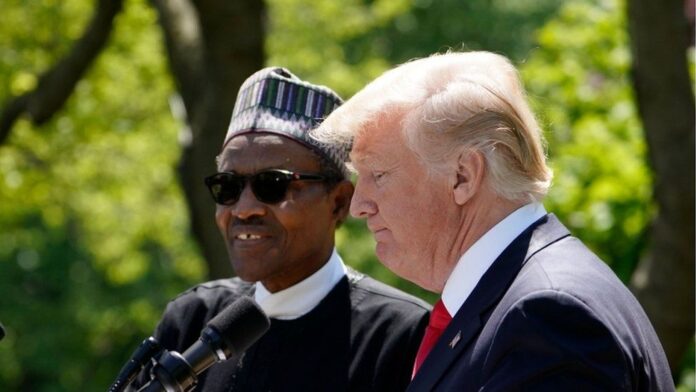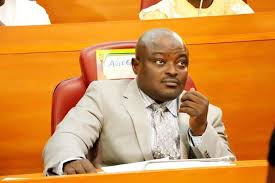By Jeph Ajobaju, Chief Copy Editor
Jacob Zuma has been sentenced to 15 months in jail by the highest court in South Africa for contempt of court while in office, a fate that may await Donald Trump in the United States and Muhammadu Buhari in Nigeria.
He cannot appeal or dodge the prison term.
“I am left with no option but to commit Mr Zuma to imprisonment, with the hope that doing so sends an unequivocal message … the rule of law and the administration of justice prevails,” acting Chief Justice Sisi Khampepe said in her scathing ruling.
Zuma, 79, was brazen and reckless as South African President for eight years from 2009 after taking over from the decent Thabo Mbeki who succeeded Nelson Mandela.
Zuma acted with impunity and was forced to resign in 2018 in a swirl of sleaze.
He did not care for the poor whose lives he was elected to uplift. Instead, he married a fourth wife, saddled the treasury with the upkeep of his harem and 19 children, and diverted public funds to build a castle for a life of luxury after leaving office.
Zuma is a tribal supremacist who whipped up his base to rail against several allegations of misconduct against him as President. His kinsmen are still cheering him on, even now in his disgrace.
In many ways, Zuma is like Trump, and is like Buhari.
Trump left the White House five months ago, but revelations are still pouring through the US media about how deep and rampant he abused his power as President from 2017 to 2021. Besides his incitement to insurrection on January 6.
Trump, 75, is up against several lawsuits, some of them criminal cases that may land him in jail.
The International Criminal Court (ICC) is investigating how soldiers under Buhari’s watch murdered youths in the EndSARS protests at Lekki gate, Lagos in October 2020. Also based on his order, police are currently killing youths in the South East.
Washington and London have told Buhari they are tallying his human rights abuses.
Whether or not corrupt Nigerian courts try him post-Aso Rock, he may face charges of crimes against humanity at the ICC.
Two recent cases in France and Bosnia point to what may happen to Buhari after leaving office. He is 78 and will still be fit to go to prison after 2023, if found guilty.
Sarkozy jailed in France
In March, Nicolas Sarkozy, 66, became the third former French President to be jailed, bagging three years in prison for corruption and influence peddling, but the court suspended two years of the sentence.
His predecessor, Jacques Chirac, was found guilty of misuse of public funds in 2011 and given a two-year suspended prison sentence for the employment of fictitious officials when he was mayor of Paris in the early 1990s – before he became president.
The last French head of state to be sentenced to jail was Marshal Philippe Pétain in 1945 – for treason after he collaborated with the Nazis.
The judge said Sarkozy could serve the remaining one-year sentence by wearing an electronic bracelet at home, without having to serve time in jail. But his political ambitions are now doomed.
Sarkozy was French President between 2007 and 2012, and was nursing a return to the job before his jail sentence.
Karadzic jailed at The Hague
Former Bosnian Serb leader, Radovan Karadzic, was in 2016 sentenced to life for war crimes and genocide by the ICC. It was announced in May 2021 that he will serve the remainder of his sentence in a prison in the United Kingdom.
Karadzic, 75, is one of the chief architects of the slaughter and devastation of Bosnia’s war from 1992 to 1995, per AlJazeera.
He was convicted by a United Nations court in 2016 of genocide, crimes against humanity and war crimes – for atrocities including the massacre of 8,000 Muslim men and boys by Bosnian Serb troops at Srebrenica.
He was sentenced to 40 years in prison, later increased to life by appeals judges at the court in The Hague, who argued the initial jail term had underestimated the “sheer scale and systematic cruelty” of his crimes.
He is currently in the court’s detention unit, but will be moved to an unspecified UK prison.
Zuma to surrender himself or be arrested
Zuma was on Tuesday given five days to hand himself in to police. Failing that, the police minister must order his arrest, according to the BBC.
The jail sentence comes after the Constitutional Court found him guilty of contempt for defying its order to appear at an inquiry into corruption while he was president.
Zuma’s time in power, which ended in 2018, was dogged by graft allegations.
Businessmen were accused of conspiring with politicians to influence the decision-making process.
The BBC recalls that Zuma made one appearance at the inquiry into what has become known as “state capture” but then refused to appear subsequently.
The inquiry – headed by Justice Raymond Zondo – asked the Constitutional Court to intervene.
Khampepe was damning in her ruling.
Zuma refused to come to the court to explain his actions, she said, and he “elected instead to make provocative, unmeritorious and vituperative statements that constituted a calculated effort to impugn the integrity of the judiciary.
“I am left with no option but to commit Mr Zuma to imprisonment, with the hope that doing so sends an unequivocal message … the rule of law and the administration of justice prevails.”
Zuma was not in court to hear the majority ruling and has repeatedly declared that he was the victim of a giant political conspiracy.
This jail sentence marks a dramatic turning point for a man who was last in prison half a century ago, for his role in South Africa’s liberation struggle, the BBC says.
Corruption allegations in arms deal
The BBC adds that in a separate legal matter, Zuma pleaded not guilty last month in his corruption trial involving a $5 billion (£3 billion) arms deal from the 1990s.
He is facing 16 counts of racketeering, corruption, fraud, tax evasion and money laundering.
Zuma blames political enemies in the governing African National Congress (ANC) party for his legal troubles.
The arms deal involved buying new fighter jets, helicopters, submarines and warships.
But questions emerged about the deal months after it was signed, with some critics saying the government should have spent the money on fighting poverty.
Zuma was South Africa’s president from 2009 until 2018 when he was forced to resign after a vote of no confidence.
On May 26, crowds gathered outside the courthouse in Pietermaritzburg city in KwaZulu-Natal province to cheer on Zuma, who still enjoys some popular support.
His defence team called for the removal of state prosecutor Billy Downer, on the grounds that he had “no title to prosecute”.
But the presiding judge ruled that the matter would be dealt with on 19 July.
A defining moment for South Africa
Zuma looked frail and spoke quietly as he stood in the dock to enter a plea of “not guilty”.
According to the BBC, this was a moment he had been seeking to avoid for decades, but he is a politically weakened force these days and his legal options have now run out.
It’s not clear how long this trial will last, or what the outcome might be. But regardless, this is a deeply symbolic and defining moment for South Africa.
Zuma is now on trial – and is likely to face many other legal challenges in the coming months.
Many of his most powerful allies in the ANC are also facing similar legal problems.
This tips the balance of power in the governing party firmly towards President Cyril Ramaphosa and his campaign to clean up the party and fight corruption.
Powerful ANC critics of Zuma openly refer to him as a “gangster-like figure” who nearly broke South Africa’s young democracy and they warn of a long struggle ahead to undo that damage.
Origin of arms deal
Newly democratic South Africa decided its military needed to be overhauled – and five years after coming into power following the end of White minority rule, the ANC government signed contracts totalling 30 billion rand ($5 billion; £3 billion in 1999).
The deal involved companies from Germany, Italy, Sweden, Britain, France and South Africa.
Controversy over the deal
Even before the allegations of corruption, the spending of billions of dollars on new fighter jets, helicopters, submarines and warships was contentious in a country where millions lived in poverty.
Others also pointed out that there was no credible threat to South Africa’s sovereignty to justify the spending.
Questions emerged within months, leading to official investigations into allegations of conflict of interest, bribery and process violations in the purchasing of equipment.















